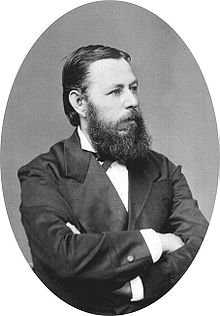- Nikolai Annensky
-
Nikolai Feodorovich Annensky (1843-1912) was a Russian economist, statistician and politician. He was a member of the populist (narodnik) movement and the Socialist-Revolutionary Party before becoming one of the founders of the Russian Popular Socialist Party (NSP) in 1906.
Biography
Annensky was born in St. Petersburg and attended the University there. When he was young, he lost both of his parents and had to care for his younger siblings, including the future Russian poet Innokenty Annensky. As a student, N.F. Annensky became involved in the revolutionary populist movement. He was also strongly influenced by the writings of N.K. Mikhailovsky. Like Mikhailovsky, Annensky rejected Marxism, which was just beginning to influence the Russian socialist movement, because it seemed to condemn the Russian peasantry to be sacrificed to the development of industrial capitalism. Instead, Annensky desired an agrarian socialism based on the peasant commune. In the 1870s and 80s, Annensky was a major representative of 'Legal Populism' and contributed to such journals as Notes of the Fatherland (Otechestvennye Zapiski) and The Cause (Delo). At the same time, he kept in contact with illegal narodnik circles. In 1880 he was arrested and sentenced to administrative exile. Released in 1883, he worked as a statistician at the Nizhni Novgorod provincial zemstvo, becoming its head in 1887. In 1893 he was involved in founding the 'People's Right' party. In 1895 he became head of the statistical office of the city administration of St. Petersburg. at the same time, he joined the 'Free Economic Society' and the radical St. Petersburg Writers' Union. Annensky's work as a statistician enabled him to gather valuable information on the social conditions of workers and peasants in turn-of-the-century Russia.
In 1901 he was arrested and exiled again for participating in an anti-government demonstration. After his release he lived in Finland, where he was involved in founding the 'Union of Liberation' in 1904, with the former Marxists P.B. Struve, S.N. Prokopovich and others. This became the nucleus of the Constitutional-Democratic Party (Ka-Dets), tsarist Russia's main liberal party. However, nnensky also retained his connections with narodnik socialism and became involved in the Socialist-Revolutionary Party (PSR). He argued strenuously against the PSR's revival of political terrorism as a tactic and deplored the influence of Marxism on its leading theorists, such as V.M. Chernov.
On the eve of the Russian Revolution of 1905, Annensky was briefly arrested again. During the revolution he helped organise the 'Union of Unions' and became its chairman. He also became editor of the liberal journal Russian Wealth (Russkoe Bogatstvo). This was initially sympathetic to the PSR, but became increasingly opposed to its use of terror. In 1906, Annensky and other populists in the tradition of Mikhailivsky, such as A.V. Peshekhonov and V.A. Miakotin, broke with the PSR and founded the 'Popular Socialist Party' (NSP). Though numerically small, this party played an important role in the tsarist Duma, where it collaborated with the liberal Ka-Dets and the Labour or Trudovik party of A.F. Kerensky. The Popular Socialists also played an important role in the Provisional Government of Kerensky following the February Revolution of 1917. Annensky himself did not live to see this; he died in 1912.
Sources
- Shukman, H. (ed.), The Blackwell Encyclopedia of the Russian Revolution. Oxford, 1988.
- Hildermeier, M., Die Sozialrevolutionäre Partei Russlands. Cologne, 1978.
Categories:- 1843 births
- 1912 deaths
- People from Saint Petersburg
- Narodniks
- Socialist-Revolutionary Party members
- Popular Socialists (Russia)
- Russian economists
- Russian journalists
- Russian translators
Wikimedia Foundation. 2010.

